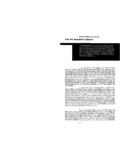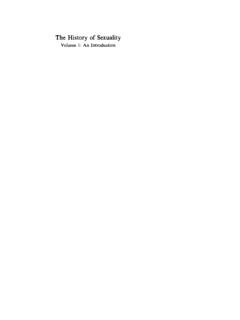Transcription of Michel Foucault. What is Enlightenment?
1 Michel foucault . what is enlightenment ? what is enlightenment ? in Rabinow (P.), d., The foucault Reader, New York, Pantheon Books, 1984, pp. 32-50. Today when a periodical asks its readers a question, it does so in order to collect opinions on some subject about which everyone has an opinion already; there is not much likelihood of learning anything new. In the eighteenth century, editors preferred to question the public on problems that did not yet have solutions. I don't know whether or not that practice was more effective; it was unquestionably more entertaining.
2 In any event, in line with this custom, in November 1784 a German periodical, Berlinische Monatschrift published a response to the question: Was ist Aufkl rung ? And the respondent was Kant. A minor text, perhaps. But it seems to me that it marks the discreet entrance into the history of thought of a question that modern philosophy has not been capable of answering, but that it has never managed to get rid of, either. And one that has been repeated in various forms for two centuries now. From Hegel through Nietzsche or Max Weber to Horkheimer or Habermas, hardly any philosophy has failed to confront this same question, directly or indirectly.
3 what , then, is this event that is called the Aufkl rung and that has determined, at least in part, what we are, what we think, and what we do today ? Let us imagine that the Berlinische Monatschrift still exists and that it is asking its readers the question: what is modern philosophy ? Perhaps we could respond with an echo: modern philosophy is the philosophy that is attempting to answer the question raised so imprudently two centuries ago: Was ist Aufkl rung ? Let us linger a few moments over Kant's text.
4 It merits attention for several reasons. 1. To this same question, Moses Mendelssohn had also replied in the same journal, just two months earlier. But Kant had not seen Mendelssohn's text when he wrote his. To be sure, the encounter of the German philosophical movement with the new development of Jewish culture does not date from this precise moment. Mendelssohn had been at that crossroads for thirty years or so, in company with Lessing. But up to this point it had been a matter of making a place for Jewish culture within German thought -- which Lessing had tried to do in Die Juden -- or else of identifying problems common to Jewish thought and to German philosophy; this is what Mendelssohn had done in his Phadon; oder, ber die Unsterblichkeit der Seele.
5 With the two texts published in the Berlinische Monatschrift the German Aufkl rung and the Jewish Haskala recognize that they belong to the same history; they are seeking to identify the common processes from which they stem. And it is perhaps a way of announcing the acceptance of a common destiny -- we now know to what drama that was to lead. 2. But there is more. In itself and within the Christian tradition, Kant's text poses a new problem. It was certainly not the first time that philosophical thought had sought to reflect on its own present.
6 But, speaking schematically, we may say that this reflection had until then taken three main forms. o The present may be represented as belonging to a certain era of the world, distinct from the others through some inherent characteristics, or separated from the others by some dramatic event. Thus, in Plato's Statesman the interlocutors recognize that they belong to one of those revolutions of the world in which the world is turning backwards, with all the negative consequences that may ensue. o The present may be interrogated in an attempt to decipher in it the heralding signs of a forthcoming event.
7 Here we have the principle of a kind of historical hermeneutics of which Augustine might provide an example. o The present may also be analyzed as a point of transition toward the dawning of a new world. That is what Vico describes in the last chapter of La Scienza Nuova; what he sees 'today' is 'a complete humanity .. spread abroad through all nations, for a few great monarchs rule over this world of peoples'; it is also 'Europe .. radiant with such humanity that it abounds in all the good things that make for the happiness of human life.
8 ' [1] Now the way Kant poses the question of Aufkl rung is entirely different: it is neither a world era to which one belongs, nor an event whose signs are perceived, nor the dawning of an accomplishment. Kant defines Aufkl rung in an almost entirely negative way, as an Ausgang, an 'exit,' a 'way out.' In his other texts on history, Kant occasionally raises questions of origin or defines the internal teleology of a historical process. In the text on Aufkl rung, he deals with the question of contemporary reality alone.
9 He is not seeking to understand the present on the basis of a totality or of a future achievement. He is looking for a difference: what difference does today introduce with respect to yesterday ? 3. I shall not go into detail here concerning this text, which is not always very clear despite its brevity. I should simply like to point out three or four features that seem to me important if we are to understand how Kant raised the philosophical question of the present day. Kant indicates right away that the 'way out' that characterizes enlightenment is a process that releases us from the status of 'immaturity.
10 ' And by 'immaturity,' he means a certain state of our will that makes us accept someone else's authority to lead us in areas where the use of reason is called for. Kant gives three examples: we are in a state of 'immaturity' when a book takes the place of our understanding, when a spiritual director takes the place of our conscience, when a doctor decides for us what our diet is to be. (Let us note in passing that the register of these three critiques is easy to recognize, even though the text does not make it explicit.)





